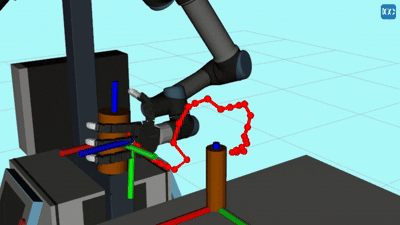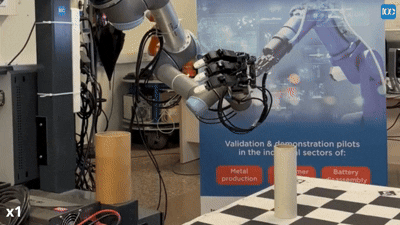The SMARTHANDLE project focuses on the development of motion and navigation planners capable of undertaking flexible handling operations for both single-arm and dual-arm robots, i.e., providing the robotic system with an adaptive capability for planning motions according to the current situation.
In this line, at UPC we have developed a motion planning framework to plan motions with geometric constraints that are defined according to the task to be performed and can be easily configured and updated. In particular, the framework allows the robot end-effector to maintain fixed orientations or remain within specific spatial volumes (boxes, spheres, cylinders, or cones), thus facilitating the finding of solutions and ensuring compliance with the task's geometric requirements. These constraints are implemented through a custom extension of the Open Motion Planning Library (OMPL) and are embedded in Kautham, a motion planning framework developed at the robotics division of the Institute of Industrial and Control Engineering (IOC-UPC).
The main features of this novel framework are:
(1) the easy definition of the constraint motion planning problem via XML files;
(2) the visualization of volume constraints in Rviz (a 3D visualization software tool for robots, sensors, and algorithms within the ROS environment);
(3) the solving of planning problems that include combinations of multiple constraints;
(4) the possibility to define constraint-satisfaction tolerance gradients for dynamic adaptation based on proximity to the goal.
Several examples have been used to test the framework, some of them in real experiments. In the following figures, one arm of the MADAR dual-arm mobile robot is performing a peg-in-hole task, with the orientation constraints ensuring correct peg alignment.


The developed motion planning framework offers a practical approach for handling tasks with geometric constraints, which are common in various industrial scenarios such as assembly and manipulation. By building on and extending existing open-source tools, the work aims to support further testing and integration in different industrial robotic applications and, in particular, in three application scenarios of the SMARTHANDLE project.